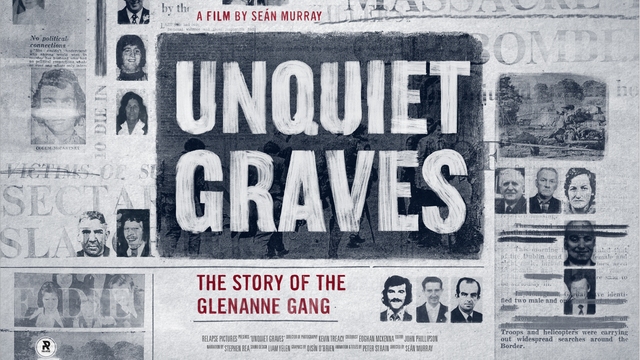Unquiet Graves
Uncovering Britain's Death Squads
 During the UK's war with the IRA, the Glenanne Gang murdered 120 innocent civilians. Shocking evidence has emerged exposing the involvement of a British Army regiment at the heart of the gang’s six-year campaign of terror. This gritty Northern Ireland documentary reveals the collusion between the British government and loyalist death squads. To the despair of the relatives, the UK still refuses to accept their role in the bloody enterprise.
During the UK's war with the IRA, the Glenanne Gang murdered 120 innocent civilians. Shocking evidence has emerged exposing the involvement of a British Army regiment at the heart of the gang’s six-year campaign of terror. This gritty Northern Ireland documentary reveals the collusion between the British government and loyalist death squads. To the despair of the relatives, the UK still refuses to accept their role in the bloody enterprise.

Festivals
 Revelation International Film Festival - Official Selection
Revelation International Film Festival - Official Selection
 Melbourne Irish Film Festival - Official Selection
Melbourne Irish Film Festival - Official Selection
 Belfast Film Festival - Official Selection
Belfast Film Festival - Official Selection
 Respect Belfast Human Rights Film Festival - Official Selection
Respect Belfast Human Rights Film Festival - Official Selection
 Galway Film Festival - Official Selection
Galway Film Festival - Official Selection
 Byline Festival - Official Selection
Byline Festival - Official Selection
 British Irish Film Festival, Torino - Official Selection
British Irish Film Festival, Torino - Official Selection
 The Irish Film Festival, Rome - Official Selection
The Irish Film Festival, Rome - Official Selection
 The Irish Film Festival, Sydney - Official Selection
The Irish Film Festival, Sydney - Official Selection
Reviews and More
“...a gritting, enraging examination of the state collusion that accommodated the murderous actions of the so-called Glenanne Gang…” – The Irish Times
“outstanding documentary film-making combining in-depth research and personal testimony” – Phil Scraton, Author (Hillsborough: The Truth)
"a documentary exposing Britain’s dirty war in Ireland" – The Canary
Listen to an interview with Director Sean Murray here.








